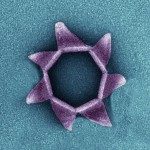Lien vers Pubmed [PMID] – 17709471
Antimicrob. Agents Chemother. 2007 Nov;51(11):3908-14
Polymyxin B (PMB) is a cationic antibiotic that interacts with the envelopes of gram-negative bacterial cells. The therapeutic use of PMB was abandoned for a long time due to its undesirable side effects; however, the spread of resistance to currently used antibiotics has forced the reevaluation of PMB for clinical use. Previous studies have used enteric bacteria to examine the mode of PMB action, resulting in a somewhat limited understanding of this process. This study examined the effects of PMB on marine pseudoalteromonads and demonstrates that the frequently accepted view that “what is true for Escherichia coli is true for all bacteria” does not hold true. We show here that in contrast to the growth inhibition observed for enteric bacteria, PMB induces lysis of pseudoalteromonads, which is not prevented by high concentrations of divalent cations. Furthermore, we demonstrate that a high membrane voltage is required for the interaction of PMB with the cytoplasmic membranes of pseudoalteromonads, further elucidating the mechanisms by which PMB interacts with the cell envelopes of those gram-negative bacteria.

